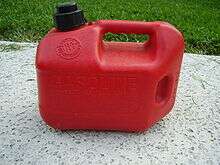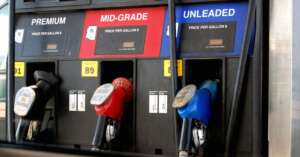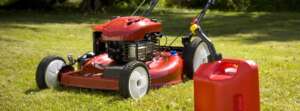Table of Contents
 Lawn mowing may not be the most glamorous of tasks, but it’s essential. And if your lawn mower runs on gas, you’ll need to ensure you’re using the right gas.
Lawn mowing may not be the most glamorous of tasks, but it’s essential. And if your lawn mower runs on gas, you’ll need to ensure you’re using the right gas.
You might be wondering what type of gas to use for your lawn mower. In this article, we’ll discuss the different types of gas and their benefits and drawbacks when using them for lawn mowing. We’ll also provide a list of the best lawn mowers for using each kind of gas. If you want to save money or get the job done efficiently, read on to find out more!
Gas For Lawn Mower – Mistake You’re Making
The purpose of lawn mower gas is to provide the energy needed to run the engine and turn the blades. The lawn mower’s engine burns the gas, creating a chemical reaction that produces heat and releases energy. The heat and power are used to turn the blades and cut the grass.
You can use gas for lawn mowers with or without oil in them. Some people even choose to add oil to their gas tanks because it makes the fuel burn more evenly and slowly.
Lawn mower engines are designed to run on a specific fuel type, so you should not try to substitute one type of gas for another unless your owner’s manual has given you explicit instructions.
What Are The Benefits Of Gasoline Engines
- Gasoline engines are easy to start and operate.
- It produces more torque than diesel-powered engines at lower speeds.
- It also has fewer pollutants than diesel fuel, which means your lawnmower will pollute less when you use gasoline instead of diesel fuel.
- Gas engines are more powerful.
- These can cut a wider swath than electric or cordless models.
- They are easier to maintain and repair and have no cord to worry about tripping over or getting tangled up in.
- Gas engines need little maintenance and can run for years without any problems.
- A manual oil change every six months is required to keep your engine running smoothly.
- The biggest downside to gas-powered models is the noise they make when you’re using them, but this won’t bother most people as long as they’re not trying to mow the lawn in the middle of the night.
Mistakes People Often Do While Running Their Mower With Gas
- You are using the wrong fuel.
- People believe the gasoline used in a lawn mower is the same as that used in cars and vehicles.
- People are not keeping the fuel tank full enough.
- People run out of gas while cutting their lawn and they have to stop, otherwise, they could damage their mower because it’s not running at full power anymore.
- People don’t clean the carburetor often enough.
- People use a dirty fuel filter.
- You are not checking the oil level regularly.
- Few people use old fuel instead of fresh.
- Many people overlook replacing the spark plugs too often or not at all.
- They try to save money by purchasing a cheap push mower.
- Often buy a zero-turn radius mower.
Types of Gas For Lawn Mower
Today’s market offers a variety of alternatives to traditional fuel, including electric-powered mowers and mowers that run on propane or natural gas.
Gasoline

A gallon of gasoline contains about 33.7-kilowatt-hours (kWh) of energy. A typical car engine can convert about 20 percent of this energy into useful power — so a gallon of gas will give you about 8 kWh of usable power at full throttle.
A typical lawn mower engine uses around 3 gallons per hour under normal operating conditions, which means it uses about 24 kWh per hour (more than 2 times as much as a car). So if you’re using a gasoline-powered mower with a 100 cc engine (about 1/10th the size of an average car engine), it would take about 5 hours to use up one gallon of gasoline — or around 200 hours (or more than 10 days) to drain an entire tank!
Ethanol
Ethanol is an alcohol product made from corn or other plants that can mix with gasoline in varying percentages depending on where you live and what engine you have installed on your lawn mower.
87 Octane Gasoline
87 Octane Gasoline for lawn mower is specially formulated to run lawn mowers, snow throwers, chain saws, leaf blowers, and other small engines. It is a high-octane fuel that provides more power than regular unleaded gasoline. The higher octane number means that it can use in higher compression engines without the risk of pinging or pre-detonation.
87 Octane gas is used in large equipment, high-compression cars, and motorcycles. The octane rating on 87 octane gasoline is 87 (R+M)/2.
Regular vs. Premium Gasoline

If you’re using regular gas, it’s usually less expensive than premium. However, if you’re using a small engine like a lawn mower, using premium fuel may not be worth the small amount of money you save.
The main difference between regular and premium fuel is the octane rating. Octane rating measures how much compression an engine can handle before the air-fuel mixture explodes in the combustion chamber and damages the engine. The higher the octane number, the more reduction an engine can handle before detonation occurs.
Octane ratings are measured from zero to 100 as Research Octane Numbers (RON). The average octane rating of gasoline is 87 RON (91 RON for premium).
Type of Gas to Avoid In Lawn Mowers
Here are some types of gas to avoid for lawn mowers:
Ethanol blended fuels (10% or more ethanol). Ethanol-blended fuels cause problems with carburetors and other fuel system components in two ways:
- High Content: If the ethanol content is high enough (15% or more), it will dissolve rubber gaskets and seals, causing them to deteriorate faster than normal. This may cause leaks in the fuel system and make it hard to start the engine.
- Too Much Ethanol: Suppose too much ethanol is present in an engine that has not been designed for it. In that case, it will break down plastic components over time – especially if they are exposed to high temperatures such as those created by idling while warming up an engine on a cold day.
FAQs

How do I know when my lawn mower needs gas?
If your lawn mower fails to start or if it sputters while running, then you probably need some gas.
How much gas should I put in my lawn mower?
Fill up your tank until it reaches its full capacity mark (the one underneath the filler cap).
Why is lawn mower gas so expensive?
Gasoline prices are based on the cost of crude oil. The price of crude oil often fluctuates, which in turn affects the price of gasoline.
Conclusion
This article provides you with all the necessary information about buying and using a gas lawn mower. By following the tips and tricks we have shared, you can use your lawn mower accurately and keep it running efficientl

